Configuration Guide for External Service Alert MongoDB Atlas on the Elven Platform
The External Services Center of the Elven Platform is the bridge that connects you to the best tools on the market to monitor, manage, and resolve incidents in a simple and efficient way. Within it, you can integrate MongoDB Atlas with the Elven Platform, allowing the reception of alerts and events related to incidents directly on the platform. This enables you to monitor and analyze your applications and services from the perspective of Incident Management, using the best practices and methodologies available, all in one place.
API Token
To integrate the Elven Platform with MongoDB Atlas, you need to create an API Token. This unique key is essential for the two platforms to connect securely, ensuring reliable and authenticated information exchange. Simply access the Organization Settings of the Elven Platform, navigate to the API section, and generate it.
Creating an API Token
In the top menu, under your user settings, click on Organization Settings.
In the API tab, click the + button to create a new API Token.
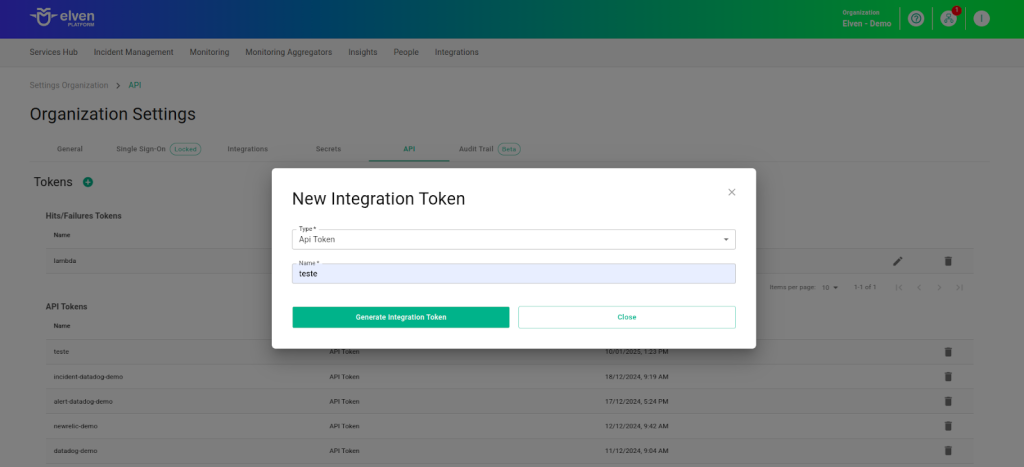
Accessing External Service Alert MongoDB Atlas
Navigate to the main menu and click on Services Hub.
In External Services Monitoring, select the Alert MongoDB Atlas item.
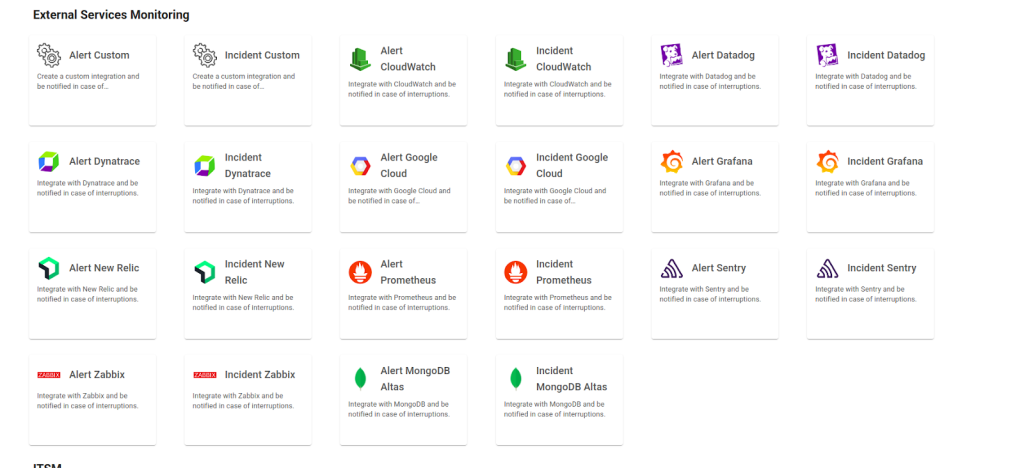
Creating the External Services for Alert MongoDB Atlas
In the form, start by filling in the External Service Name field, which will be the name of the external service, and define the Responders, that is, the people or teams who will receive notifications related to this service. After that, click CREATE to proceed. This action will create the initial record of your external service.
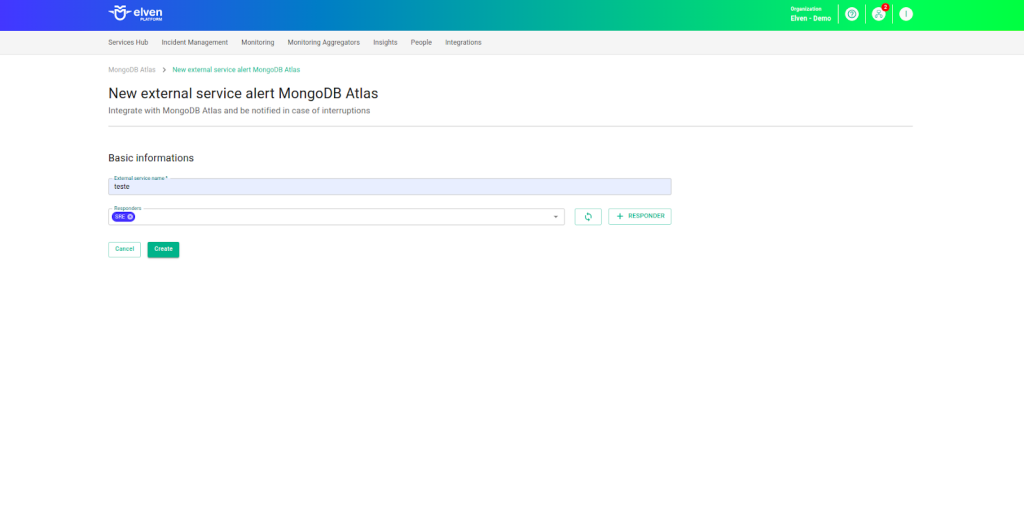
Next, locate the API Token you generated earlier and select it to configure the integration with MongoDB Atlas.
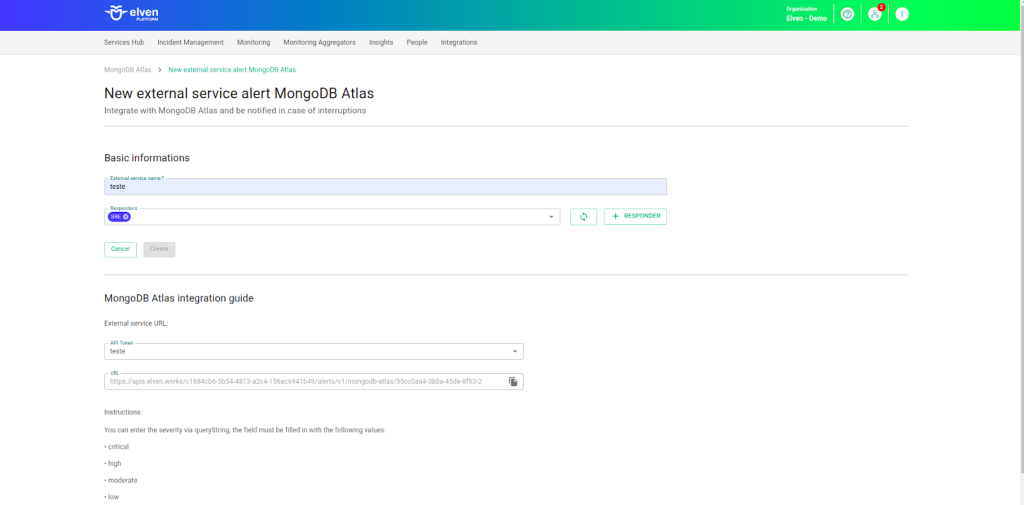
Configuring Webhooks in MongoDB Atlas
The integration between MongoDB Atlas and the Elven Platform through Webhooks is a simple and efficient way to centralize alerts and notifications, ensuring your team is always up to date on the most important events in your database. To get started, access your project in Atlas and locate the left sidebar menu. There, go to the Databases section and click on the Clusters option. This area allows you to manage and monitor your MongoDB instances.

In the upper right corner of the screen, you will see an alert icon, this is where the alert configuration begins. Click the icon and then choose one of the available options to create a new alert. A modal will be displayed for you to configure the details of this new monitoring.

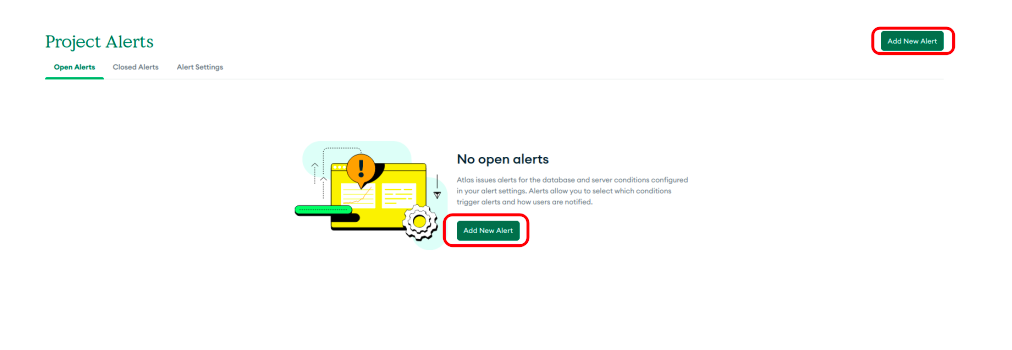
Inside the modal, you will have a few steps to customize your integration. In step 3, click Add Notification Method and select the Webhook option. At this point, you will need to enter the Webhook URL provided by the Elven Platform, ensuring that MongoDB events are securely directed to the Elven environment.
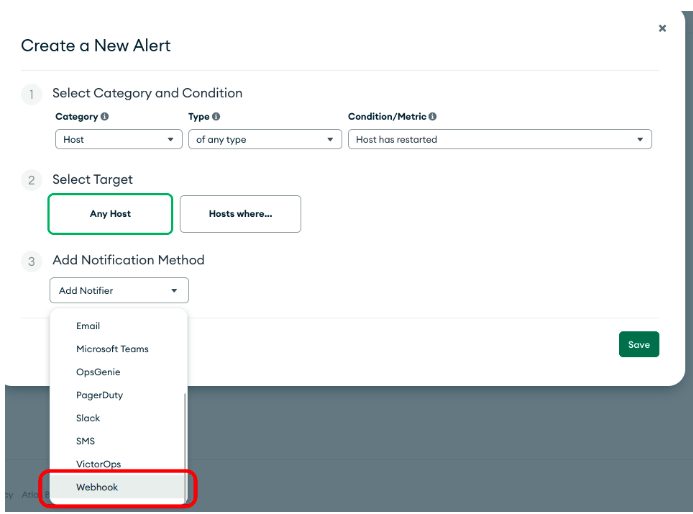
After entering the URL, complete the configuration by clicking Save. With this, your integration will be active, allowing MongoDB Atlas alerts to be sent directly to the Elven Platform. This connection makes it possible to manage database events in a centralized way, organizing critical information and facilitating quick and assertive decision-making.
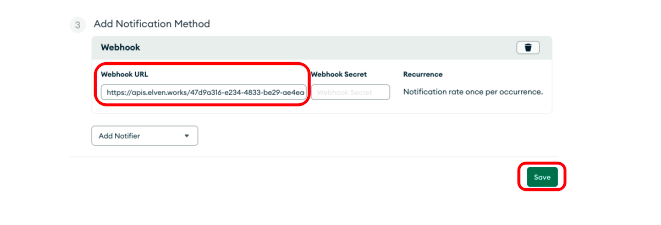
Once configured, the service will appear in the External Services Monitoring Center, categorized by status, making it easier to monitor incidents with priority given to those in an alarm state.
Additional Security and Performance Settings
IP Whitelist: API communication can be configured to allow only authorized IPs. To enable or modify this setting, contact Elven Platform support.
Rate Limiting: The default request limiting time is 5 minutes, but it can be adjusted as needed. For changes, contact Elven Platform support.
These settings ensure greater security and control over the data traffic between integrated systems.
Glossary of Technical Terms
API Token: A unique key used to authenticate communication between two platforms. In the context of this documentation, the API Token securely connects MongoDB Atlas to the Elven Platform. Organization Settings: Section in the Elven Platform where you can manage organization settings, including the creation of API Tokens. External Service Name: Name that identifies the external service during its configuration in the Elven Platform. Responders: People or teams designated to receive notifications and respond to alerts or events related to incidents. Webhook: A communication method that allows one platform to automatically send notifications or information to another system in real time, using a URL as the integration point. MongoDB Atlas: Cloud-managed database service for MongoDB, offering advanced monitoring and management for database instances. Clusters: Sets of MongoDB instances managed within MongoDB Atlas, used to store and process data. Media Types: Settings in MongoDB Atlas that define how and where event and alert notifications will be sent. Notification Method: Notification delivery method configured in MongoDB Atlas. For integration with the Elven Platform, the Webhook is used. Webhook URL: Address generated by the Elven Platform to receive notifications from MongoDB Atlas, establishing the connection between platforms. Modal: Interactive window that appears over the main interface to allow configuration or execution of specific actions. Incident Management: The process of identifying, analyzing, and resolving issues related to systems and services, aiming to minimize impact and quickly restore normal operations.
Last updated
Was this helpful?

